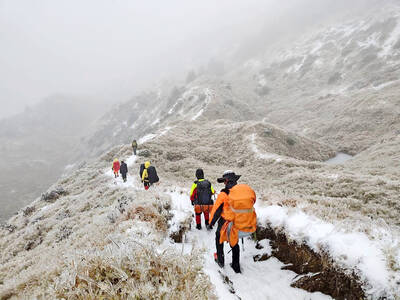Taiwan ranked 29th on Transparency International’s Corruption Perceptions Index 2017, up two notches from its 2016 ranking, with a score of 63, marking a six-year high.
The Berlin-based international coalition against corruption on Wednesday published the index, an annual ranking of countries based on perceived levels of public sector corruption.
The report found “a high corruption burden in more than two-thirds of the [180] countries surveyed.”
Taiwan’s score of 63 out of 100 — where zero represents highly corrupt and 100 represents very clean — puts it above both the global average and the regional average for the Asia-Pacific region of 43 and 44, respectively.
Portugal and Qatar also received a score of 63, making it a three-way tie at No. 29.
Regionally, Taiwan ranked seventh among the 31 countries and territories in the Asia-Pacific region, where more than half of the countries scored less than 50.
According to Transparency International, there has been little progress made in tackling corruption in the Asia-Pacific region, with only a few countries having “experienced small, incremental changes indicating signs of improvement” in the past six years.
Taiwan’s score has been pretty stagnant since 2012, when it received a score of 61, which persisted until 2015, when it jumped to 62 before dropping again to 61 in 2016.
Although the report did not address specific developments in Taiwan that contributed to last year’s score, it gave four recommendations for regional improvement.
These are putting in place laws and institutions that will prevent corruption from happening in the first place; reducing impunity for the corrupt; improving space for civil society to speak out; and improving integrity and values.
Globally, even leading country New Zealand did not achieve a perfect score.
The highest score this year, given to New Zealand, was 89; followed by Denmark at 88; Finland, Norway and Switzerland at 85; Singapore and Sweden at 84; Canada, Luxembourg, the Netherlands and the UK at 82; and Germany rounding out the countries scoring in the 80s at 81.
Countries and territories that performed poorly included Angola and Turkmenistan at 19; Iraq and Venezuela at 18; North Korea, Equatorial Guinea, Guinea Bissau and Libya at 17; Sudan and Yemen at 16; Afghanistan at 15; Syria at 14; South Sudan at 12; and Somalia at 9.

Trips for more than 100,000 international and domestic air travelers could be disrupted as China launches a military exercise around Taiwan today, Taiwan’s Civil Aviation Administration (CAA) said yesterday. The exercise could affect nearly 900 flights scheduled to enter the Taipei Flight Information Region (FIR) during the exercise window, it added. A notice issued by the Chinese Civil Aviation Administration showed there would be seven temporary zones around the Taiwan Strait which would be used for live-fire exercises, lasting from 8am to 6pm today. All aircraft are prohibited from entering during exercise, it says. Taipei FIR has 14 international air routes and

The Ministry of National Defense (MND) today released images of the military tracking China’s People's Liberation Army (PLA) movements during the latest round of Chinese drills around Taiwan. The PLA began "Justice Mission 2025" drills today, carrying out live-fire drills, simulated strikes on land and maritime targets, and exercises to blockade the nation's main ports. The exercises are to continue tomorrow, with the PLA announcing sea and air space restrictions for five zones around Taiwan for 10 hours starting from 8:30am. The ministry today released images showing a Chinese J-16 fighter jet tracked by a F-16V Block 20 jet and the

Snow fell on Yushan (Jade Mountain, 玉山) yesterday morning as a continental cold air mass sent temperatures below freezing on Taiwan’s tallest peak, the Central Weather Administration (CWA) said. Snowflakes were seen on Yushan’s north peak from 6:28am to 6:38am, but they did not fully cover the ground and no accumulation was recorded, the CWA said. As of 7:42am, the lowest temperature recorded across Taiwan was minus-5.5°C at Yushan’s Fengkou observatory and minus-4.7°C at the Yushan observatory, CWA data showed. On Hehuanshan (合歡山) in Nantou County, a low of 1.3°C was recorded at 6:39pm, when ice pellets fell at Songsyue Lodge (松雪樓), a

NO SHAME IN RETREAT: Hikers should consider turning back if the weather turns bad or if they do not have sufficient equipment, the Taroko park headquarters said Two people died of hypothermia over the weekend while hiking on Hsuehshan (雪山), prompting park authorities to remind hikers to bring proper equipment and consider their physical condition before setting out in the cold weather. Temperatures dropped over the weekend, bringing snow to high altitudes in Shei-pa National Park. One hiker, surnamed Lin (林), who on Friday was traveling with a group of six along the Hsuehshan west ridge trail, lost consciousness due to hypothermia and died, the Shei-pa National Park Headquarters said. On Saturday, another hiker, surnamed Tien (田), in a group of five on the southeast of the west